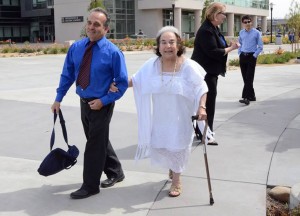SDSU to honor activist and educator Gracia Molina de Pick

Gracia Molina de Pick was born with social justice in her blood.
The daughter of activists and educators, she began to form her vision of protest and equality from an early age.
“Born in Mexico, as a toddler I always remember not being served a meal unless I raised my right hand and said ‘Qué viva la Revolución que nos da el pan que comemos!’ (Translated to ‘Long live the Revolution to whom we owe our daily bread!’),” she said. “This was the beginning of my professional and activist life. I carried that awareness of responsibility to act then, and I continue to even today.”
And act she did. After moving to the United States more than 50 years ago, Molina de Pick became a major figure in the Chicano Movement, leading the way to the first Chicana/o Studies programs at several colleges and universities in San Diego.
On Saturday, March 14th, San Diego State University’s Love Library and College of Arts and Letters will honor Molina de Pick at a private reception for her contributions not only to SDSU but also to all of the community.
She recently donated the archives of her life’s work –some forty boxes of rare manuscripts, photographs, letters, and memorabilia –to the library’s Department of Special Collections and University Archives.
The collection will strengthen the library’s archive relating to Chicana activism in San Diego, according to SDSU Professor Emeritus Richard Griswold del Castillo.
“Gracia is being honored because of her consistent support for social justice and generosity in giving her archive of life work to SDSU’s library for future generations,” he said. “Gracia has also given funds to establish a scholarship for community activist scholars at SDSU. She is also being recognized because of her prominent roll in supporting Chicana/o Studies at SDSU, Mesa College, and UCSD.”
During the private reception, San Diego Council member David Alvarez will present official recognition of Molina de Pick’s work by the City of San Diego.
“I am proud to honor Gracia Molina de Pick and her tremendous accomplishments,” Alvarez said. “Gracia is a life-long educator, feminist, mentor, and community activist for women’s equality, indigenous peoples, labor and immigrants’ rights.
She has been an energetic proponent of educational and feminist reform especially for Latinos and has been repeatedly recognized for her advocacy efforts.”
Molina de Pick said that “I never would have expected this recognition.”
To her, her life’s work and legacy is only the result of what she learned to do since she was a little girl growing up in Mexico City, “having taught the best that I could and having actively participated in political life.”
She said that SDSU played a major role in her life as a lifelong educator. This is where she began her academic career in the U.S.
“I entered SDSU as an international student with the goal of obtaining my teaching credential for grades 7 to 12,” she said. “I took the required courses for all international students, U.S. History 1A to graduate courses, and, with transferable units from the Feminist University, Mexico City, I ended up with my teaching credential, and simultaneously with masters degrees in U.S. History and Spanish.”
She remembers that the university was a very different place back then. And her house became the de-facto headquarters for Chicano activism at SDSU.
“At that time there was only a handful of Mexican-American SDSU graduate students and they would meet to provide each other support and encouragement to survive in graduate school,” she said. “One of them, Manuel Romo, asked me on their behalf if they could meet at my home, which was located close to Peterson Gym. I agreed and of course made dinner for them and participated. This type of student meetings continued in my home until I went to work at UCSD.”
Having played such an important role in her life, Molina de Pick said she’s thankful for the honor she’s receiving from SDSU.
“SDSU provided me the opportunity to qualify for teaching positions, and to exercise my family-learned responsibility to act by helping the handful of Mexican-American graduate students attending SDSU struggling to survive and graduate.”





